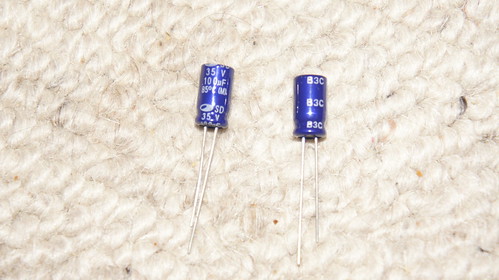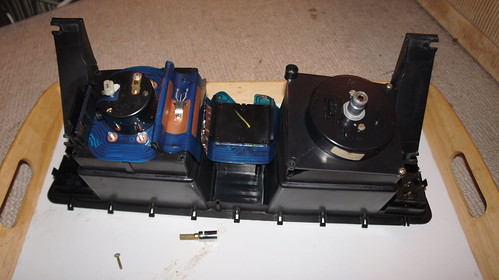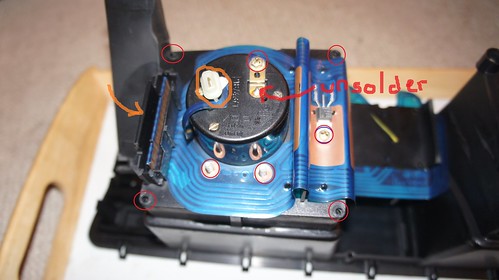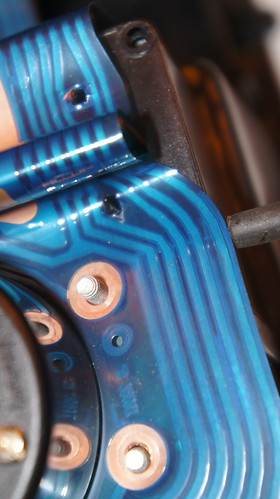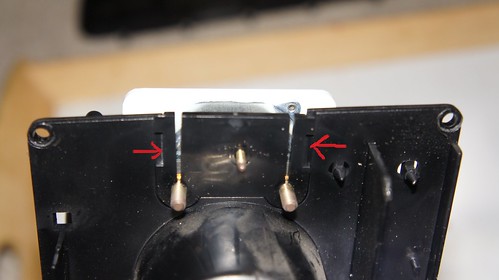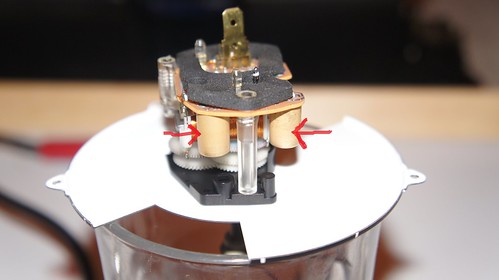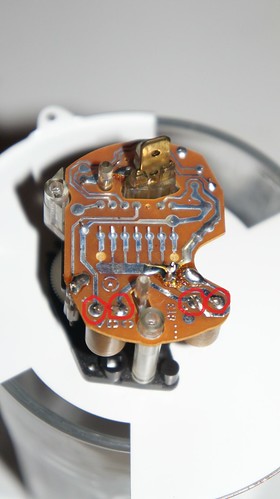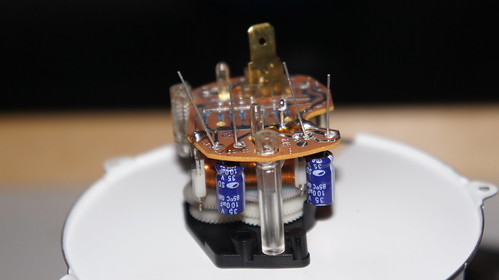Fix your Analogue clock
Printed From: The Brick-yard
Category: T3 Section
Forum Name: Useful threads.
Forum Description: All old, but useful threads will be dumped here so they don't get lost!
URL: http://www.brick-yard.co.uk/forum/forum_posts.asp?TID=72774
Printed Date: 20 Apr 24 at 02:37
Software Version: Web Wiz Forums 12.06 - https://www.webwizforums.com
Topic: Fix your Analogue clock
Posted By: club joker 84
Subject: Fix your Analogue clock
Date Posted: 02 Apr 12 at 00:41
|
The analogue clock in my van’s been irritating me for a few
years by randomly running fast and slow and generally being useless. Turns out it’s pretty easy and costs less
than a quid to fix! I had a brainwave and searched Google for “vanagon clock fix” and found this site - http://www.pauldottrip.com/84vanagon/analogclock/analogclock.html" rel="nofollow - http://www.pauldottrip.com/84vanagon/analogclock/analogclock.html Good information, but a little light on instructions, so I decided to write up how I did it. Basically you need to replace 2 capacitors and you should be good to go. If your clock is still ticking, but not keeping good time, this seems to be the cause of the problem. I’m no electronics genius, but it’s fairly straightforward. I reckon you’d be fine if you done a CDT GCSE or similar. You will need various screwdrivers and sockets to take the instrument cluster apart, plus a soldering iron, some solder, some wire cutters and a glass to rest the clock on whilst you work on it. You also need to purchase 2 capacitors from Maplins or similar. They need to be 100μF and be suitable for over 12V. I used 2 100μF 35V Radial Electrolytic Capacitors (Maplin part number VH38R). These cost all of 29p each. http://www.flickr.com/photos/57884190@N07/6890702402/" rel="nofollow"> http://www.flickr.com/photos/57884190@N07/6890702402/" rel="nofollow - DSC01070 by http://www.flickr.com/people/57884190@N07/" rel="nofollow - ClubJoker84 , on Flickr First remove the instrument cluster from your van. It’s quite obvious how to do this. Undo the 2 screws on either side, pull off the large connector plug on the right hand side (behind the clock), unplug the speedo cable and pull out the switches. Bring it indoors. http://www.flickr.com/photos/57884190@N07/6890686036/" rel="nofollow"> http://www.flickr.com/photos/57884190@N07/6890686036/" rel="nofollow - DSC01059 by http://www.flickr.com/people/57884190@N07/" rel="nofollow - ClubJoker84 , on Flickr Now remove the clock. To do this you need to move the circuit film. Pull off the white clip circled in orange in the photo. Be careful here as it holds a bit of the circuit film onto the clock contact and it is quite easy to tear the film. Undo the 5 nuts holding the film onto the back of the clock (2 above and 2 below the clock). Undo the 6 screws circled in the photo, 1 at each corner, 1 on top of the clock and one on the transistor on the right hand side. This will allow you to lift the clock slightly off the cluster and unclip the big black connector on the left hand side. There is a clip at the top and the bottom. These are quite stiff. Rest the clock back on the cluster and put the black connector clock to one side. http://www.flickr.com/photos/57884190@N07/6890687482/" rel="nofollow"> http://www.flickr.com/photos/57884190@N07/6890687482/" rel="nofollow - DSC01060 by http://www.flickr.com/people/57884190@N07/" rel="nofollow - ClubJoker84 , on Flickr The circuit film is held on the clock by a number of “spikes” as shown in the following photo. You need to prise the film off these very carefully. I used a small screwdriver to do this. The film can now be lifted away from the clock and the clock removed. Put it face down on top of the glass so you do not damage the hands. http://www.flickr.com/photos/57884190@N07/7036785149/" rel="nofollow"> http://www.flickr.com/photos/57884190@N07/7036785149/" rel="nofollow - DSC01061 by http://www.flickr.com/people/57884190@N07/" rel="nofollow - ClubJoker84 , on Flickr Next step is to remove the temperature and petrol gauges. These are simply clipped in place. Just squeeze the clips to remove them. Set them down carefully as the needles are delicate. http://www.flickr.com/photos/57884190@N07/7036789941/" rel="nofollow"> http://www.flickr.com/photos/57884190@N07/7036789941/" rel="nofollow - DSC01064 by http://www.flickr.com/people/57884190@N07/" rel="nofollow - ClubJoker84 , on Flickr You will be left with the clock mechanism in its case. With it face down on top of the glass, you will see that it is held in by 3 small screws at the back of the case and 3 around the front. It is also held by a solder connection marked “unsolder” in the first picture. Unsolder this before undoing the screws. You can get unsoldering tools that suck the solder away, but I’m too tight to buy one of these. I did it by prising up the copper connector whilst I heated up the solder. Once the solder is molten, the copper contact will just lift off. Undo the 3 screws front and back and you should be able to lift the plastic casing off. http://www.flickr.com/photos/57884190@N07/6890695698/" rel="nofollow"> http://www.flickr.com/photos/57884190@N07/6890695698/" rel="nofollow - DSC01065 by http://www.flickr.com/people/57884190@N07/" rel="nofollow - ClubJoker84 , on Flickr Turn the mechanism around until the 2 gold cylinders underneath the board are facing you. These are the capacitors that you need to replace. Pull off the foam backing on the circuit board. You need to unsolder the two capacitors. You will see their “legs” sticking up through the board as circled in the photo. Either use your unsoldering tool or prise them off whilst you heat the solder. http://www.flickr.com/photos/57884190@N07/6890697626/" rel="nofollow"> http://www.flickr.com/photos/57884190@N07/6890697626/" rel="nofollow - DSC01067 by http://www.flickr.com/people/57884190@N07/" rel="nofollow - ClubJoker84 , on Flickr Clear out the holes in the board. Take your new capacitors and poke them through the holes. Note that one leg is longer than the other. The long leg is the +ve side and needs to go through the hole marked +ve. On mine these were on the left as you looked at the board. Solder them in and snip off the excess. http://www.flickr.com/photos/57884190@N07/6890704564/" rel="nofollow"> http://www.flickr.com/photos/57884190@N07/6890704564/" rel="nofollow - DSC01071 by http://www.flickr.com/people/57884190@N07/" rel="nofollow - ClubJoker84 , on Flickr Reassembly is the reverse of the disassembly. Put the foam
back in place, put the plastic case back
on the back and screw it in place.
Resolder the contact on. Clip the fuel and temperature gauges. I gave the needles a clean at this stage –
big difference! Put the circuit film
back on and replace all the screws and nuts. The big black connector block can
now be clipped back on. You need to be very careful when you put the white
connector back at the rear of the clock.
It is easy to crease the circuit board.
Put the instruments back in the van, reconnect switches, speedo etc. and
enjoy perfect timekeeping. Ben |
Replies:
Posted By: Sensible_Steve
Date Posted: 02 Apr 12 at 16:02
|
You've got a clock! You Lucky, lucky, lucky, B*st*rd!
It must be the 'deluxe' model...... ------------- If you can keep your head when everyone is losing theirs...Then you have seriously misjudged the situation |
Posted By: jason k
Date Posted: 02 Apr 12 at 16:32
|
nice work, moved to useful threads for future use ------------- Bcs shallowest surf award winner 2006 camperjam 2011 chug and tug team member aberdare. south wales newest member of karmann korner no longer the only moderator to manage to ban himself |
Posted By: club joker 84
Date Posted: 02 Apr 12 at 21:13
It's not just deluxe, it's a Club Joker don't you know!  I took the clock for granted when I first got the van, then it broke and pissed me off. Now I get a nice smug feeling every time I use it.  |
Posted By: Tee3
Date Posted: 02 Apr 12 at 21:18
tidy job. Ive edited the title to "analogue" clock, so all those with busted LCD units dont get excited  ------------- YOU CANT EDUCATE GAMMON  http://www.tee3.co.uk/" rel="nofollow - http://www.tee3.co.uk/ |
Posted By: Wilber
Date Posted: 12 Jan 15 at 20:08
|
Has anyone ever written instruction to replace the LCD clock on the T3? I'm looking to replace mine, if no one has documented this to date I'll see what i can knock up. In the meantime I need to source a suitable new LCD so this could take a while.... ------------- http://www.fli-fi.co.uk" rel="nofollow - http://www.fli-fi.co.uk http://www.camper-cafe.co.uk" rel="nofollow - http://www.camper-cafe.co.uk |
Posted By: Mark-Hans
Date Posted: 17 Jan 15 at 22:29
|
No instructions, but replaced loads of them. Dash Out..., put the clocks on the a table. The digital clock is on it's own at the bottom, held by a couple of small phillips screws. Be VERY careful taking out the small plug from the centre of the clock, it's part of the dash printed circuit. Take the clock out, plug a new one in. They seem to be available now and then on E Bay. I think I paid seventy quid for the last one!... not cheap. Simple job anyway. Mark |
Posted By: Leo
Date Posted: 05 Apr 15 at 18:10
|
Hello. I just reinstalled the analogue clock and instrument cluster in my 1984 Vanagon. It works !!! I just followed the instructions & photos. The hardest part was unsoldering, soldering was a bit better. It was the capacitors, bought them at Radio Shack. Thank you !!! Lionel--- ------------- Leo--- |
Posted By: wawesty
Date Posted: 06 Oct 15 at 18:51
| De-soldering braid makes the capacitor removal much easier, it wicks the solder away. Thanks for the nice write up. |
Posted By: FlyingDurchman
Date Posted: 15 Nov 16 at 14:46
| Thank you for posting these instructions!! I followed them precisely and the clock works perfectly! However, now the battery light and OXS light are on and remain on. Did anyone else have this issue? Mine is a 1983.5 wasserboxer. Cheers! |
Posted By: club joker 84
Date Posted: 16 Nov 16 at 22:55
|
Glad the instructions were helpful. No issues with any lights on my dash. I reckon that you have probably just disturbed something or broken a track when you had the dash apart. I'd get a multi meter and just check for anything like this. Good luck! Ben
|
Posted By: FlyingDurchman
Date Posted: 17 Nov 16 at 18:27
| Thanks for your response!! Lights have since disappeared on their own and the clock is still ticking! |
Posted By: JOOLZ
Date Posted: 03 Jun 17 at 11:38
|
Hi When I Stripped down the clock there was only one capacitor on the circuit board & not two as in the photo, the design must be different as there is only space for one capacitor mine is situated on the left side of the board. I replaced the single capacitor with the new one refit the clock which worked fine for about 4 hrs & then stopped again. Should I have put the 2 new capacitors in place of the single one on the circuit board or could there be another fault with the clock. Many thanks Joolz |
Posted By: club joker 84
Date Posted: 04 Jun 17 at 20:49
|
Hi there, You won't need to fit two capacitors I there if there was only one to start with. There could be another fault, but I think that it is more likely that you need a different capacitor to the one that I used. You will need one that does the same as the one that you took out. Did the one that you take out have any markings in it? Ben |
Posted By: JOOLZ
Date Posted: 06 Jun 17 at 00:19
|
Hi thankyou for your reply, The clock is now working again with the capacitor you recommended the fault was a trapped wire, I noticed the radio & cigarette lighter was also dead due to a blown fuse, the dead short was at the back of the Radio to the chassis, I dont know if it was a coincidence or I disturbed the wires removing the instrument panel first time when fixing the clock but it ran for 4 hrs before the fuse blew which is very strange. Many thanks Joolz |

